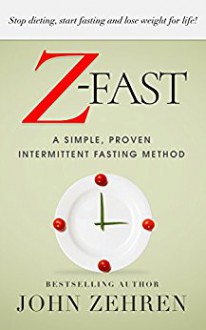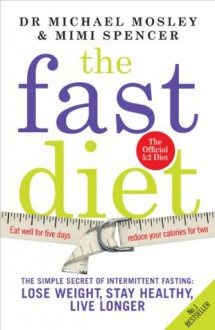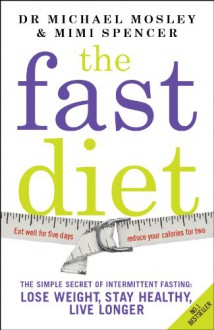An intermittent fasting diet has several health benefits and can be done in multiple ways.


I must confess that I have struggled with my weight from very early on (well, all my life) and, like the author of this book have tried (or read about) a variety of diets. In my case, if something doesn’t make sense to me, I don’t try it, especially if it is something long-term. (I am a doctor but I’ve worked mostly as a psychiatrist, and I cannot claim specific expertise on this subject, even if I’ve read plenty about it). I have been hearing about intermittent fasting for quite a while and know people who have tried some versions of it (like eating only 500 calories two days a week), and I felt curious when I saw this book on offer for free. After all, fasting has a long tradition and plenty of people and cultures adhere to it, in one fashion or another.
The book is easy to read (I read it all in one evening), and although it is packed with information, it is not overly complicated. There is some degree of repetition because some of the information is relevant to several of the points the author discusses but does not get excessive or boring. The style of writing is conversational, and it is easy to imagine that you are talking to the author, who comes across as a knowledgeable and likable person, fully convinced of the goodness of the method, and interested in sharing it with as many people as possible. I’d recommend checking a sample of the book to make sure it suits the reader’s taste.
While many books of this kind try to sell you something (a method that involves subscribing and paying for a programme or buying supplements or other books, foods to be delivered at home, an exercise programme), this is not the case here. The author clearly states that he does not have time to prepare elaborate meals or to exercise for hours on end, but what he can do is not eat. The plan might not suit everybody as it does require a big deal of discipline and strong will (most diets do) but it is pretty flexible, and it makes sense. Different people feel differently, but for some, it might be easier to have nothing at all to eat at times than to try to restrict the amount of this or that or engage in very complex routines. The book contains testimonials from a variety of people who have tried fasting as a method to lose and control their weight and have found it useful, some for a large number of years. I particularly liked the idea of having an emergency plan and making a strong commitment to take action if the weight goes over a certain level. Personally, I cannot say if the plan works or not as described, but I’d recommend the book as an interesting read for people considering fasting as a method to control their weight.
My only warning would be that readers must pay attention to the fact that the book mentions that it might not be a suitable method for people with certain medical problems as it does not place a lot of emphasis on that aspect. I’d recommend anybody with chronic health conditions or taking regular medication to check with their physicians before attempting this.
An easy-to-read book that proposes a simple weight loss and maintenance plan that will particularly appeal to those with little time and who prefer simple options (not easy, though).

I wish more comprehensive research and testing had been done to date, as I'd like to see documented results on people who suffer from the same medical conditions that I do. Still, cutting your calories to a quarter of your usual intake twice a week is refreshingly straightforward and doable, and my hubby's already dropped a few kilos since he started this about a month ago.
 First off, I've never been on a diet in my life.I've been a vegetarian for 25 years and eat a healthy varied diet with lots of whole grains, vegetables, dried legumes, etc. but since moving to Paris have been eating way too much in the pastry department. Like everyone else reviewing this, I saw the BBC Horizon program "Eat, Fast and Live Longer" (search YouTube - it keeps getting posted there) and was really impressed. This book gives details of the science and recommendations on how to manage the fasting. I've been doing it for a month and feel much lighter and have a better relationship to hunger and portion size. This is a great way to reset and remind your body that less is more. (Dovetails nicely with mindfulness.)My only complaint is that the recipes are all high protein even though in the science section, that's mentioned as being harmful. The reason they give is that for only two days a week, it won't be a problem and that protein helps dull your appetite. Well, whole grains and heaps of steamed veg do that as well and it's a lot healthier.The only thing I didn't like about the book was the section by Ms Spencer -- truly appallingly writing. Read for the info, not the literary merit!
First off, I've never been on a diet in my life.I've been a vegetarian for 25 years and eat a healthy varied diet with lots of whole grains, vegetables, dried legumes, etc. but since moving to Paris have been eating way too much in the pastry department. Like everyone else reviewing this, I saw the BBC Horizon program "Eat, Fast and Live Longer" (search YouTube - it keeps getting posted there) and was really impressed. This book gives details of the science and recommendations on how to manage the fasting. I've been doing it for a month and feel much lighter and have a better relationship to hunger and portion size. This is a great way to reset and remind your body that less is more. (Dovetails nicely with mindfulness.)My only complaint is that the recipes are all high protein even though in the science section, that's mentioned as being harmful. The reason they give is that for only two days a week, it won't be a problem and that protein helps dull your appetite. Well, whole grains and heaps of steamed veg do that as well and it's a lot healthier.The only thing I didn't like about the book was the section by Ms Spencer -- truly appallingly writing. Read for the info, not the literary merit!